Displaying items by tag: Peter Malone's Movie Reviews
Back in Action
BACK IN ACTION
US, 2025, 114 minutes, Colour.
Jamie Foxx, Cameron Diaz, Mckenna Roberts, Rylan Jackson, Kyle Chandler, Glenn Close, Jamie Demetriou, Andrew Scott.
Directed by Seth Gordon.
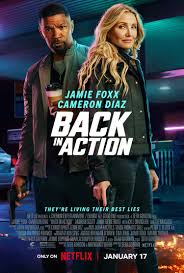
After more than 10 years away from the screen, Cameron Diaz, so popular in the 1990s and 2000s, returns to the screen, with some enthusiasm.
This is an enjoyable action show even if, some critical of this kind of show tell su we have seen most of it before. But, is that necessarily a bad thing!
Cameron Diaz works here with Jamie Foxx, secret agents, plenty of action to establish their characters, but betrayals, suspicion of the MI6, their being abducted, a fight in the air, crash landing and the decision to disappear and lead an ordinary life.
Then 15 years later, we see the now-ordinary American couple, their two teenage children, the complaining suspicious daughter, the precocious young son, devoted parents in Middle America, at home, sports and teachers meetings, Mother too demanding. Then exhibiting rather martial arts skills when least expected.
Blame social media for breaking the secrecy but, in an encounter in a club to rescue her daughter, mother goes into action and is photographed, displayed on social media, their American handler immediately coming to catch up with them, his being shot at, and their going on the run with their children, no explanations, the children continually amazed.
They go to the grandmother in England, an elitist British spy in her day, owning a mansion – and, a great bonus, one of those very eccentric performances from Glenn Close. And, into the bargain, the MI6agent is played by Andrew Scott, increasingly popular and versatile on stage and screen, especially with his interpretation of Ripley.
Plenty of action, quite some comedy with the grandmother’s toyboy in training for the Secret Service and not too good at it, Jamie Demetrio, betrayals, climaxes, and final action in the Thames.
Yes, maybe we have seen a lot of it before, but no harm now in seeing it in the hands of Jamie Foxx and Cameron Diaz and Glenn Close.
- Straightforward title? The initial action, 15 years of domestic life, back in action?
- References to James Bond and Jason Bourne, espionage action, old-style films, dangers, undercover, expertise in fighting, weapons? The espionage situation, MI6, the CIA? Belarusian terrorists? The lull in the 15 years, then back in action, no holds barred? The musical score?
- The opening, the disguise, the social, Chuck and his control, meeting the host, getting his fingerprint, opening the safe, getting the key, the dangers, the escape? The encounter with Baron, the past relationship? On the plane, abducted, the fights, the death of the pilot, the crash, the parachute and the landing, the decision to disappear?
- The 15 years, domestic comedy, the almost-Boomers, their style, compared with the children, 14 and 12, life at school, studies and friends, boyfriends, the club and dances, the young boy intelligent, studious, and the parents spying on them, using all the technology, the reaction of the children?
- The episode at the club, the fight, going online, their being identified, Chuck arriving at the door, his being shot, the gunmen, getting the children, the car, the pursuit? The puzzle of the children? Emily and Matt have become very domesticated, but going into action again, Emily exhilarated by the fight the club?
- The issue of the key, Matt hiding it with Emily’s mother, going to England, the flight, the continued bewilderment of the children, at passport control, the fake passports, observed, getting the rental car, the drive, the pursuit, at the diner, the petrol in the flamethrower, the fighting techniques, the children in the English breakfast, using the pewter, enabling the pinpointing of their presence?
- The continued chase, barren in pursuit, shooting the truck with the pipes and blocking the road? Barren discovery going to Emily’s mother is? His knowing that Emily thought he was a traitor?
- Emily and the story about her mother, the dispute between them, boarding school in America, her mother is a spy? Glenn close enjoying this rule? Nigel, the toyboy, training for the Secret Service, his ineptness, his dumb remarks, yet the romance? Boys showing him up with throwing the darts and weapons?
- The siege of the house, finding the Chuck was the traitor, his explanation of his being sacked because of their disappearance? His contact with the various groups?
- Emily’s mother, her manner, career, tough, British, not embracing? It is in Nigel? Matt recovering the key? The abduction of the children? The discovery of the event at the Tate Modern?
- Dressed up for the occasion, getting in, Chuck with the key, Daphne and her controls, the option, the bidders, turning the lights of the city on and off, opening the floodgates for the Thames?
- Confrontations, the pursuit, taking the children, on the boat, Chuck in his communication with Daphne, grandmother to the rescue with the shooting, Emily and Matt, on the bikes, the tactics, into the boat, risking the children, the fights?
- Nigel, the encounter with Daphne on the crash, with the computer, his dithering, ultimately succeeding despite himself? Send himself as a hero?
- The final rescue, everybody in the US, the soccer match, the daughter and her success, reconciliation between Emily and her mother, Nigel present? Get into the car, and Barry with a proposal for future action?
Presence

PRESENCE
US, 2024, 85 minutes, Colour.
Lucy Liu, Chris Sullivan, Callina Liang, West Mulholland, Eddie Maday, Julia Fox.
Directed by Steven Soderberg.
An eerie opening. The camera roams through a large dark and empty house, many rooms, staircases, gazing out the windows, the eye of the camera seeming to be the Presence. And this continues even in daylight, even when a family of four arrives to look at the house in order to move in. The style of the roving camera also suggests something of paranormal activity.
And, quietly, even minimally at first, there is something paranormal.
However, the drama is focused on the family. The mother, Lucy Liu, is a business-woman, always looking at her phone, brisk and decision-making, dominant. On the other hand, her husband, Chris Sullivan, has left the decisions to his wife, is suspicious of some shady aspects of what her business might be doing, but is devoted to his children. The son, Eddie Maday, eyes on his phone, petulant towards his sister, his mother’s favourite, some tantrums. The daughter, Calina Liang, is a somewhat introspective teenager, upset at two deaths of girlfriends at her school, alleged suicides. She is the first to notice strange disturbances in her room.
Another aspect of the film is that it is presented in what it might be called short chapters, a particular focus, an incident, a conversation – and then fading to black.
This is a film by Steven Soderberg who has been making all kinds of films for 35 years, big budget (the Ocean’s series), many experimental like this one, filmed in three weeks within the confines of the house, Soderberg always acting as his cinematographer and editor (using nom de plumes). The screenplay is by David Koepp, better known for big budget screenplays.
So, the important thing about Presence is suggestion rather than dramatics. For those who are interested in family dramas, there are interesting sequences of family dynamics, especially where the father explains to his daughter his own difficulties in relating to his mother. But, there is also another character, the son’s friend who comes to visit, rather casual in his approach, but eventually taking a liking to the daughter, becoming involved in sexual activity, causing stress to the girl.
There are moments of paranormal activity, puzzling, the camera quivering, but all the time the camera observing, a presence.
There is a development towards the end of the film, unexpected, disturbing.
For the impatient audience, the process will seem too slow. For audiences who take the film as it comes, adjusting to its pace, interested in its themes and characterisations, Soderberg’s film and his style can be intriguing.
- The title, the focus on presence? The camera and into roving is the presence? But what the camera is representing? And the overtones of paranormal activity?
- Small budget, filmed in three weeks, within the house, the camera roving at the opening, all the rooms, staircases, the dark? The transition to the light? The camera still roving, looking out the windows? Observing the activity outside the window, cars driving past, the estate agent arriving, the workers coming into the house, the suggestion that something is awry? The atmospheric score?
- The of the film in sections, mini chapters, the fading to black, suggestions, a touch disjointed? The effect?
- The title, audience expectations? Horror? Scare? Or atmosphere?
- The agent, arriving, in a hurry, turning the lights on, welcoming the visitors, explaining the mirror, persuasive?
- The family, the arrival, the successive brief chapters, the house furnished, settling in, the rooms, the daughter’s room and the photos, the son’s room? Meals? Discussions?
- The mother, businesslike, decision-making, love for her husband, her children, the son her favourite? On the phone, the business deals, suggestion of shady aspects? Her husband’s suspicions, his becoming exasperated, tempted to leave? Relationship with his children? The discussion with his daughter about his own relationship with his mother? The son, phone, room, moods, his friend coming to visit?
- The suggestions of the paranormal, the books moving in the air, the camera quivering, the shelf crashing…?
- The discussion about the two girls dying, the effect on the daughter, suicide or foul play? The sense of presence and the atmosphere of the girls and their death?
- The friend, arriving again, friendly with the daughter, the sexual encounter, her response? His return, her resistance? The effect on him?
- The friend, his attack, masking the daughter, the revelation about the other girls, his malice and motivation?
- The sense of presence, alerting the brother, his rushing upstairs, seeing his friend, attacking him, their falling out the window, their deaths?
- The consequences, the family moving out, the mother taking some time, their leaving?
- The camera, moving out of the house, the overview of the house itself, the street, the location?
- The overall effect, impatient viewers and its slowness, others surrendering to the style of the film and its atmosphere?
Quanto basta/ As Needed
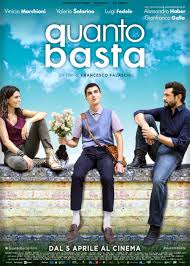
QUANTO BASTA/ AS NEEDED
Italy, 2018, 92 minutes, Colour.
Vinicio Marchioni, Valeria Salarino, Luigi Fedele.
Directed by Francesco Falaschi.
The Italian title suggests also “when enough is enough”.
This is an amiable Italian film, the audience soon realising where it is going and having the option to say that it is all predictable or to enjoy going with the unfolding of the plot. This is one of those dramas where a man is challenged to be his better self.
We see Arturo getting out of jail, resuming his life, but discovering that he is a man of his temper, intolerant, and can be physically violent. The authorities arrange for him to do community service – teaching cooking to a range of young men and women with Asperges. There is one particular student, Guido (played by Luigi Fedele in his only film role), severe symptoms, not wanting to be touched, very careful about health and germs, and with a memory for details, able to tell Arturo immediately his whole career and character. The person in charge is Anna, a psychologist who had worked for a law firm and was tired of manipulating the truth for cases and has volunteered to work with the students.
On the one hand, there is the story of Guido, cared for by loving grandparents, but skilled at cooking, an ability to recognise all kinds of tastes in food, wanting to take part in the competition for Young Tuscan Chefs. On the other hand, there is Arturo and his past connections, trying to get help from his expert chef mentor, some shady connections and an offer of working for a company, especially for the opening of a new restaurant in Milan.
Needless to say, Guido nominates Arturo as his mentor for the competition, at two row initially unwilling, but setting out for the competition, Guido with all his symptoms, Arturo and his sharper reactions, the first session of the competition, the judge a past rival with Arturo, interpreting the rules for Guido’s inability to work close to much sound. And, of course, he succeeds in the first round.
Some more complications, Anna arriving, predictable romantic connections, Guido misinterpreting how to respond to the young woman he thinks likes him, learning the lesson, encouragement by Arturo, his not complying with the rules for the menu but the chief chef praising it and affirming him.
And the inevitable, a year later, and Arturo working with the Asperges group, with Anna.
- The title, as explained, knowing when enough is enough?
- Rome, the Centre for the students, the restaurants, Tuscan towns, the competition, Milan and the hotel and kitchen? Atmosphere? The musical score?
- Arturo’s story, getting out of prison, his temper and charges, the revelation about his past, trained by the chef, rivalries, angers and prison? Community care, meeting Anna, meeting the students, Guido and his sensitivities, his encyclopedic recital of life stories and characters, his ability to make lists, recognise menu ingredients? The effect on our two row?
- Guido, his age, Asperges and the symptoms, touch, germs, mental ability? Wanting to participate in the competition? Naming Arturo as his mentor?
- Arturo and his story, going to the chef who taught in, his bad reputation, his shady friend, the meeting, the possibilities of working in the restaurant, the opening in Milan, his preparing a menu, expected in Milan?
- Travelling with Guido, the issue of the driving, the music, the crash and telling? Anna arriving? Upset? The competition, the President of the jury and his past rivalry, the competitors, the young girl pleasant to detail, sitting aside, success?
- Arturo going to Milan, the kitchen, the plans? His calling his teacher chef to help Guido? His return, the two finalists, the menu, success, Guido’s refusal to use the ingredients, losing the trophy? The MasterChef coming, affirming Guido’s menu and condemning the president?
- One year later, Arturo working with the group, the happy ending?
Thank You, I'm Sorry
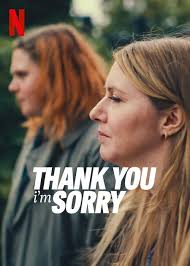
THANK YOU, I’M SORRY
Sweden, 2023, 90 minutes, Colour.
Sanna Sundqvist, Charlotta Bjorck, Amael Blomgren Alcaide, Ia Langhammer, Juan Rodriguez, Peshang Rad.
Directed by Lisa Aschan.
The title is spoken at the end of the film.
This is the story of a depressed woman, a fickle husband, her absolute devotion to her young son, now pregnant. With the unexpected death of her husband, the stepping in of her mother-in-law, coping with the death, with her son, the funeral, and some platitudes from the earnest pastor, there is a sad atmosphere.
She is alienated from her older sister who went to live with their father during their divorce, she with her mother. The father is now in care. The sister has won the lottery, has a bizarre way of life, the oddest of boyfriends who is self absorbed in an extreme “New Age” style. But, she ventures a reconciliation with her sister, is greeted by her nephew who calls her Uncle Linda, and he is also devoted to her do
Various emotional ups and downs, the birth of the child, some straight talking with her psychologist mother-in-law who tends to dominate, bonding with Linda – and, at the end, a visit from her father who speaks the lines of the title.
- The title, spoken at the end by Sara’s father? Cinema summing up the themes of family relationships and failures?
- The Swedish film, Swedish and Scandinavian sensibilities, characters, lifestyle, relationships? The musical score?
- Sara’s story and the focus, looking in the mirror, the message from her husband, potentially leaving her? Her being pregnant? Discovering him dead? The consequences, the doctors, his parents arriving, the impact on her son, Elliot? Her mother-in-law ringing her sister, Linda?
- Linda’s story, older sister, looking younger, winning the lottery, her lifestyle, in the bath, the dog, the boyfriend coming, Jasse arriving home, the flawed relationship with him, his obsessions, courses, self-improvement, focus on himself, expectations of Linda?
- Helen and her husband, his Spanish background, devotion to her son? Psychologist? Dominant, intruding, taking charge? The bond with her grandson? The preparation for the funeral, the hymns? The visit of the pastor, kindly, but platitudes with Sara? In the church, the sermon, Sara and her reactions? The aftermath? At the house?
- Linda, the background of the parents’ separation, with her father, Sara with their mother, the mother’s death? The father in care, selfish, losing his mental ability? Linda and her decision to go to the funeral?
- Sara, her relationship with her son, his bright and breezy attitudes, her reticence about his father’s death, Helen and his being straightforward? The effect on the boy?
- Linda, coming to the house, Sara wary, the tensions between the two, the gradual breaking down, Linda and her being able to play with Elliot, and the dog? Her becoming Uncle Linda?
- Sara, the pregnancy, visits to the doctor, to build up? The presence of Helen? Wanting to move in? The mellowing with Linda, Linda moving in? The sisters beginning to understand each other? Linda and her visits to her father?
- Linda picking up Elliot, her missing out, Sara upset, the story of their father disappearing, fighting him?
- The buildup of the pregnancy, the birth of the daughter, the family, the new child, bonding, Elliot and his sister?
- The visit of their father, and his apology?
- A strong portrait of a depressed woman, her husband to disappointment, devotion to her son, pregnancy, resentment to her father, resentment of her sister? The possibilities for reconciliation?
Cento Domeniche/ A Hundred Sundays
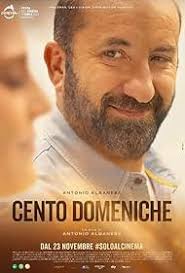
CENTO DOMENICHE/ A HUNDRED SUNDAYS
Italy, 2023, 95 minutes, Colour.
Antonio Abanese, Donatella Bartoli, Liliana Bottone.
Directed by Antonio Albanese.
A Hundred Sundays, like a month of Sundays, can be a long difficult time.
This is the story of a worker in a shipyard, good at his job, good at supporting young workers, retiring, welcomed by the workers but made redundant by the authorities. He is played by Antonio Albanese who also directed the film.
The film starts very cheerfully, an Italian town, friendships, the old men and their bocce games, a sunny atmosphere. Antonio has been divorced, does have rendezvous with a married woman in the town, is devoted to his daughter and her fiance who run a store. When she announces the engagement, this is one of the goals his life, and he enters wholeheartedly into the preparations, getting advice for the location, the number of guests…
Antonio also lives at home looking after his aged mother.
He goes to the bank, he listens to the smooth talking new manager, discovers that his investment is in stocks, is reassured, but soon the news comes that the bank is in danger, collapsing.
Antonio consults his friends who are supportive, but learns more and more about the bank, eventually getting a rifle, going to the bank, a confrontation, demands, the police coming – and, unexpectedly for the audience, his killing himself.
And the film adds information, 2023, of recent difficulties with Italian banks, their failing, and so many ordinary people losing their savings.
- The title? The long time?
- The setting, the town, the port, the surrounding countryside, homes, shops, workshops, atmosphere? The musical score?
- The tuple beginning, the friendships, Antonio and his life, retired, volunteering work, helping, caring for his mother, love for his daughter, the preparations for the wedding? The shift in tone? The focus on finance, the loan, the stocks and his account, the bank failing and the consequences?
- Antonio, personality, helping at work, not being paid, the discussions with Carlo, support, the visiting accountants, his financial situation, ousted? At home, care for his mother, her hearing, the doctor’s, outings? Conversation at home? Love for his daughter, her fiance, running the shop?
- The Joy of the wedding, so important for him, the number of guests, the location, discussions with his friends, their advice? Going to the bank, discussion with the manager, the issue of his account, stocks, their increasing, the 30,000-euro loan, the assistant at the bank?
- The rumours, his apprehension, the discussion with Carlo and his reassuring him? The friend at the store, warnings, explaining that Carlo had saved his money? The man from the bank, his conscience, warning Antonio? At the restaurant, seeing the young woman and her husband, following her, the confrontation, her explanation, her own losses? Fear of being fired?
- The discussions with his daughter, her wanting to postpone the wedding, his obsession?
- The visits to his friend, her husband absent, the relationship, his asking her opinion, phoning her and the meetings?
- The visit from his ex-wife, her marrying again, her advice and support?
- The growing desperation, his friends from playing bocce, Martin and his support, offering financial help, Antonio rejecting it?
- The growing desperation, getting his rifle, going to the bank, ousting the customers, the new manager, confronting him, the young woman present, the police arriving, his demand to see the previous manager, the police and the intervention, persuasion? His final desperation, his sitting on the chair, actor to back the camera, the shot, death?
- The jolting impression, the pessimistic ending, and the final information about finance and banks in Italy and the effect of so many people losing their savings?
Curse of the Were Rabbit
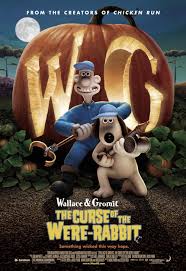
WALLACE AND GROMIT IN THE CURSE OF THE WERE-RABBIT
UK, 2005, 85 minutes, Colour.
Voices of Peter Sallis, Ralph Fiennes. Helena Bonham Carter, Liz Smith, Geraldine McEwan, Mark Gatiss.
Directed by Nick Park, Steve Box.
Wallace and Gromit have become British icons – and one of Britain’s best exports. Their creator, animator, Nick Park, brought them to the screen in 1989 in the Oscar-nominated A Grand Day Out. They won their Academy Award in 1993 with The Wrong Trousers and again in 1995 for A Close Shave. Wallace and Gromit were popular the world over.
Now they appear in their first feature-length film. And they have another success on their hands, topping the US Box Office on its opening weekend at the beginning of October. But the makers received bad news as well when the production studios in Bristol, the Aardman company, burnt to the ground the same weekend. While they lost decades of film history, many of the clay models were out on exhibition and were not destroyed.
The films themselves are indestructible. They have great appeal for both children’s audiences and for adults.
As the title indicates, the film is something of a spoof of horror movies. And that is a smart move. After all, so many horror stories have become classics of literature and cinema. Older audiences will have quite a lot of fun noticing the parallels with horror movies and the amusing send-ups. Of course, it starts with the play on werewolf. This time the monster is a gigantic rabbit who has an enormous appetite for vegetables. This is especially disastrous for the village because all the inhabitants are desperately tending extraordinarily sized pumpkins and gardens full of veg to win the competitions at the forthcoming fair. Gromit himself is growing a giant marrow. Wallace, of course, does not like vegetables at all. He loves cheese.
Wallace is an inventor (and we see quite a few of the inventions from the previous films as well as a machine for collecting rabbits out of lawns – a kind of giant vacuum cleaner – without injuring them). Not only does he now create a rabbit Frankenstein creature, trying to brainwash the rabbits to hate vegetables, he also becomes Dr Jekyll and creates his alter ego Mr Hyde.
When the going gets touch, the people turn on the rabbit just as they do in Son of Frankenstein – and there is the potential for a bride of the Were-Rabbit. But, when the rabbit is pursued, he seizes the lady of the manor and climbs a tower as did King Kong of old. Just when you thought, the writers might have run out of ideas, they set up Gromit like a British Snoopy and create an air battle modelled on World War I and the attack of the Red Baron. You see how inventive they have been.
The script is also funny and witty. In the middle of the chase, Gromit turns on the car radio and it is playing Bright Eyes, the theme from Watership Down! Some of the jokes have mild and amusing innuendo that will be lost on the smaller audiences.
Nick Park has done wonders with the clay characters, patiently working with stop-motion photography for years. It is extraordinary the expressions he can create – especially with Gromit who does not speak but whose facial gestures are worth a thousand words.
The voices are wonderful as well. Peter Sallis has been supplying the voice of Wallace for years and it would be hard to imagine Wallace without him. The villain of the piece, Victor Quartermain, a bounder who wants to marry Lady Tottington for her manor and money and hunt down rabbits with his rifle, is played by Ralph Fiennes sounding far more vigorous than in his films, a real moustachio-twirling performance. Lady Tottington is Helena Bonham Carter, more lively and funny than she has ever been as well.
Fans of Wallace and Gromit will also welcome the musical score with the familiar anthem from the previous films. The Curse will keep you smiling.
Balota/ Ballot
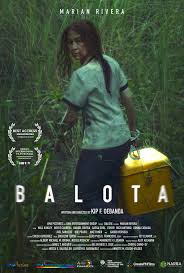
BALOTA/ BALLOT
Philippines, 2024, 102 minutes, Colour.
Marian Riviera, Will Ashley, Royce Cabrera, Gardo Versoza,Mae Paner.
Directed by Kip Oebanda.
Almost 100 years, world audiences have watched on the political struggles in the Philippines, democracies, dictatorships and the Marcos family, uprisings and freedom, the reign of Pres do to take, the return of the Marcos Next Generation…
This film is a fiction based on many stories, the setting is 2007, a local election, the pompous mayor standing for re-election, throwing her weight around, the tough candidate campaigning, a wealthy man, with a mansion, a huge collection of artworks, a great believer in individual power.
The focus is on a local teacher, Filipino star and award winner, Marianne Riviera, a reputation in her village, influencing a number of the people with her teaching and tutoring. She has a teenage son, American father, and scenes of schooling, basketball games, young people gathering, but also the protesters campaigning against the Mayor and her social injustice against workers, a woman leader campaigner because of the death of her husband in the cause.
The teacher Enemy is charged with transferring a box of ballots to the governor’s house, an attempted bribe, the death of her companion, her fleeing, chained to the ballot box into the jungle, desperate phone calls with her son, corrupt police taking over, murders, folks, her eventually going to the house of the candidate, his trying to win her over – but protesters gathering at the gate and some kind of indication of justice.
At the end, it is 2010, another election time – and Teacher Enemy looking straight into camera indicating that probably very little has changed.
- A film for the Filipino audience, politics, corruption, rich and poor, elections? For the international audience, a perspective on the Philippines? The history of politics in the 20th and 21st-century is?
- The setting of the small town, the visuals of the town, homes, school, election officers, the streets and demonstrations, the contrast with the mansion and the artworks, the countryside, the jungle? The musical score?
- The setting, the 2000s, Filipino memories of politics at the time, elections and the provinces, local elections, the candidates, campaigns, supporters, demonstrations, protests? Behind-the-scenes, corrupt police, folks, murder, buying of votes?
- The focus on Teacher Emmy, her status, as a teacher, the influence on people, relationship with her son, teenager, his friend, Jimbo, Jimbo’s mother? Scenes of her teaching porous students, urging them on? Her role with the elections, the supervision, the voters, her being invited to demonstrate against the Mayor, her reticence, her own personal perspective on the candidates?
- The background of the candidates, the mayor, her pushy style, relationships and ex-lovers, ownership, plantations, unjust wages, the wife demonstrating against the death of her husband, leading the protests? The gay men, the two sisters, taking sides and demonstrations? The wealthy candidate, his mansion, guards, the range of artworks in his house? His henchman?
- Seeing thugs in action, pursuit of people, buying votes, murders, bodies abandoned? The leader against Teacher Emmy, in the car with the ballots, the fellow teacher, the driver proposing payment, the gun, the teacher shot, Emmy hitting the driver with the ballot box, her escape into the jungle, hiding, the pursuit, her phone, contact with her son, with Jimbo and his mother, the violence of their deaths? The threats to her son, the phone calls, the information she gave, going to the house of the candidate, being allowed in, still holding the box, her injuries, the reception by the candidate, his boasting of his wealth and art, her decision to play up to him, the food and drink, the conversation, his plans? Her son’s phone call, warning him away? Holding her ground, the reaction of the candidate, violence, payoffs, his plans and his power struggle? In the wheelchair, the confrontation with the protesters, his arrest? And is campaigning for the next election in jail?
- Enzo, his age, American father, friendship with Jimbo, computer games, basketball, with the girls, persuaded to go to the protests? His support of his mother? The death of Jimbo and his mother? The phone calls, his desperation, his being arrested, in the cell, Morales and the food, support, the old policeman and corruption, taking into the jungle, the empty gun on the shots, Morales, shooting the policeman? Morale is indebted to Teacher Emmy, his gay identity and Emmy support? His continuing to help with Enzo? The arrest of the candidate?
- Teacher Emmy, the rescue, her working with the wife of the murdered man, the confrontation with the mayor, the ballot box, confronting the Mayor, her making promises and signing them, legal cases?
- Three years passing, Teacher Emmy and her classes and prestige, and so and his legal studies, the friendship with Morales?
- The prospects of the election, the candidates, the promises, the candidate in jail, the focus on Teacher Emmy and the focus on the audience perspective on elections and corruption?
Brutalist, The
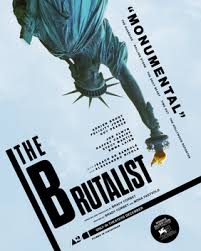
THE BRUTALIST
US, 2024, 215 minutes, Colour.
Adrien Brody, Felicity Jones, Guy Pearce, Joe Alwyn, Raffey Cassidy, Stacy Martin, Isaach de Bakole, Alessandro Nivola, Michael Epp, Emma Laird, Jonathan Hyde, Peter Polycarpou.
Directed by Brady Corbet.
The Brutalist is a vast film in scope and length. Beginning with an Overture, it becomes cinematic orchestral and in its two acts and epilogue cinematic operatic.
The screenplay is by former child actor, Brady Corbett, who directed Childhood of a Leader, Fox Looks, working with his partner, Mona. The scope of the storytelling is quite complex. It is multi-themed, beginning with Nazi persecution of the Jews, business close-up in the oppressive dark, concentration camp consequences. It then moves to re-settlement in the US and good use of the Statue of Liberty, Ellis Island, speeches and translations, then out into the vastness of America, a brother. In New York, then a train to Philadelphia.
Throughout the film there is a documentary evidence, radio news commentaries, about the significance of Pennsylvania in the history of the US.
The central character, Laszlo, is an architectural genius, and in prewar Germany, found unacceptable to national socialism, interned, along with his wife and niece. For most of the film, there is voice-over of letters from his wife, still in Europe.
This is the post-war USA, American business, migrants making good, shrewd businessman with no family backgrounds highly successful.
This is the story of Laszlo’s rise, not without its many pitfalls and falls. At first working with his cousin, Alessandra Mueller, participating in the commission from the son of a millionaire, Harry Van Buren is in (Joe all one) elevate his father, Harrison Van Buren’s personal library. Progress is made, Laszlo’s skill in design, his fine eye for detail, his modern furniture style, making a great impact until suddenly, Harrison bursts angrily onto the scene and dismisses everyone. Harrison is played by guy Pearce most convincingly.
But the central performances that of Adrien Brody (who won an Oscar for the pianist in 2002). He is sympathetic, sometimes upsetting, many outbursts, a growing sense of his own worth, his reaction to being challenged.
The film echoes the American confidence of the 1950s, progress and peace, buildings and achievement, the plans for building Harrison Van Buren’s community Centre in honour of his mother. There is the exhilaration of the design, very modern, the meeting of city officials, the inevitable as with material supply, budget overruns, interference from bureaucratic advisers, outbursts. And accidents, possibilities for being sued, compensation, he is in delay.
Unexpected is a sequence when Laszlo and Harrison go to Carrara to choose marble from the quarries there amazing visuals of the cliffs and quarries. But there is a key episode in Carrara that has something of a devastating effect on Laszlo and will offer a challenge to Harrison.
And, finally his wife, Felicity Jones, arise from Europe, wheelchair written, with the taciturn niece. And further complications with the Van Buren family, and with the niece and her fiance deciding to go to live in Jerusalem.
The film begins with an overture good end with an epilogue – and The Brutalist does, are vindication of Laszlo’s career and achievement, exhibition at Venice be a gnarly, and a tribute to Laszlo by his niece.
Often grim, sometimes overwhelming, moments of joy, and a perspective on American history in the post-World War II years.
- Title and tone? Contemporary art and architecture? Personalities in themselves and their communication?
- The scope of the film, orchestral and operatic, overture, acts and epilogue? The sound, the music, chords, heavy, light background? The visuals, the use of this division and its style? Editing and pace? The vastness of the impact?
- The structure, the effect of the overture, setting the tone, from the concentration camps, the crowds, the darkness, the suffering, the release, the focus on Laszlo, the communication with Erzsbert? The freedom, the voyage, the Statue of Liberty and the various angles? Freedom and future?
- The first part, from 1957 to the early 1950s? Migrants arriving, Ellis Island, the speeches and translations? Into the city – the glimpse of the women, the brothels, Laszlo and his friend? This impact after the years in the camps?
- To Philadelphia, the train, the meeting with Attila, the welcome, change of name, his store and furniture, marriage to Audrey, Catholic? Their work and reputation, Laszlo criticising the furniture? But his working, his modern designs, Harry Van Buren and, the visit, the commission, the library, the background story, the father and his devotion to his mother, her illness? The surprise?
- Gradual information about Laszlo, his studies in Germany, his skills, designs, Jewish background, Nazis and concentration camp? His skill in design, creative, demanding? The vision for the library, the visuals, the space, the cupboards opening, the shelves, the issue of the ceiling, its crashing? Harrison Van Buren arriving, the viciousness of his outburst, the dismissal? Laszlo and his reaction, the false accusation by Audrey, being ousted?
- Laszlo, shovelling coal, the previous encounter with Gordon and his son, Laszlo going to the queue for the bread, their working together? Laszlo and his personality, accepting his fate? The continued communication with Erzsbert?
- The arrival of Harrison Van Buren, his apology, researching Laszlo’s background, their discussions, the repayment, the possibilities for the future? The further conversations, Harry and his vision, as a tribute to his mother, the details of his background story, single mother, rejection by her parents, their later coming for money, his interviewing, withdrawing the $25,000, giving them 500? His mother’s death? His folio of photos of Laszlo’s work in Germany? The discussion about Laszlo’s past? The discussions about building the centre, the gathering of people and Mayor to present the project?
- The focus of the film on the building of the project, the long years, the plans, the materials, Laszlo and his explanations of the structure, shapes, worship, the role of the Cross, the sunlight? The happy progress, Gordon and his work? The encounter with Leslie, they working together, ups and downs?
- The financial difficulties, the time, Leslie and the consultant, Laszlo and his impatience, insulting, Harry and his mediating? The visit to Carrara, the marbles, Laszlo’s friend, the choice of the material, the celebration of the night, the drinking, the strange encounter, Harrison and his behaviour, talk, Laszlo his vulnerability, audience reaction to what they saw, what they thought they were seeing? The aftermath?
- The train derailment, the lawsuits, the financial difficulties, Laszlo offering his payment of the building to continue?
- Erzsbert, with their niece, the opening of the film and the interrogation of the niece, her growing up, mute, Erzsbert and her being confined to the wheelchair? Pain, the issue of drugs, Laszlo and his use of drugs for his broken nose and pain, dependence on Gordon?
- Erzsbert, in herself, the meals with Harrison and his family, journalist training, Harrison getting the job, some financial independence? The tentative relationship with Laszlo, the gradual change in Laszlo, the communication and love? Her pain, the drugs, her collapse, hospital?
- The niece, quiet, Harry Van Buren, his complaint, the incident with the niece, swimming, out into the woods, his return, behaviour? The effect on the niece? Her later fiance, the meal and discussion, going to Jerusalem?
- Erzsbert, her going into the meal, her denunciation of Harrison and the rape? Harry and his defence? Margaret and her care for Erzsbert? Harrison and his retreat into the building, the search throughout the building and tunnels, his death?
- The epilogue, Venice and its beauty, the biennial, the catalogue, the visuals of Laszlo’s architectural achievements, in the wheelchair, his age, the emotion of his niece’s speech, his response? His achievement?
- Part of American history, post-World War II, the migrants, the Jews, prejudice and racism, finance, exploitation, achievements? The focus on Pennsylvania and its achievement and history? The final impact for the audience and being immersed in this world and experiencing the characters, likes, dislikes, difficulties, challenges?
Emilia Perez
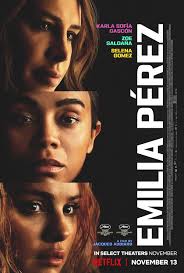
EMILIA PEREZ
France, 2024, 132 minutes, Colour.
Karla Sofia Gascon, Zoe Saldana, Selena Gomez, Adriana Paz, Edgar Ramirez, Mark Ivanir.
Directed by Jacques Audiard.
Even if you have heard about Emilia Perez and heard about its drama and its music, its impact is still surprising, very surprising.
This is the work of French director, Jacques Audiard, who has directed some strong and tough films like A Prophet, Rust and Bone, even a Western, The Sisters Brothers, but they don’t quite prepare us for Emilia Perez.
Even without the music, the singing and the dancing, there is a strong narrative. On the one hand, at the centre, is a young lawyer, Rita (Zoe Saldana, Golden Globe, Best Supporting Actress), getting murderers off charges, rather disgusted at and her profession. But, she is abducted, is confronted by a cartel chief who has a special commission for her, his disappearance, getting his wife and children to safety in Switzerland.
Even when we know the plot, the reality of the special commission is still something of a surprise. The issue is trans-gender, the cartel leader and his forming into Emilia Perez. Both roles are played by Karla Sofia Gascon, herself transgender, an imposing performance.
As mentioned, there is a wide range of songs, inserted to dramatise particular characters, different styles of music, dramatic lyrics, sometimes song and dance routines. Rita sings about her life and her attitudes towards her life, the cartel chief sings, Emilia sings, as does the chief’s wife, Jessi (Selena Gomez) and, one of the doctors Rita consults in Tel Aviv about the surgery,
Face out. Four years later. Rita is working as a lawyer in London, invited to a dinner, sitting next to an imposing rather glamorous woman – who looks deep into her, and Rita recognises Emilia Perez.
Which means that the second part of the film, while in Mexico, is a story about Emilia trying to bond with her children, posing as an aunt, suspicious of the behaviour of Jessi who links up with a past lover, but, more importantly, the opportunity for a cartel chief to do some kind of good, some reparation, disturbed by the relatives of those who have disappeared, starting a foundation to dig up graves, identify bones, restore some kind of peace to bereaved families. And a complication in a relationship with one of the wives who actually does not grieve the death of her brutal husband.
It has to come to a head, of course, and it does so in a rather Mexican cartel violence fashion.
Punning on the director’s name, some have called the film ‘audacious’. In many ways it is. In many ways unpredictable. And, so often when we are wondering where it is all going, the characters burst into self-identifying songs.
- The impact of the film? The drama? The music and songs? The interconnection? Real, surreal? The wards and nominations?
- The work of the director, the French origins of his story, the Mexican settings, French language, Spanish, English? The range of the cast?
- The impact of the songs, dramatising each of the characters singing, the lyrics, the musical rhythms and style, the musical numbers, choreography, within the context of the narrative, the hospital, clubs…?
- The initial focus on Rita, as a lawyer, her background, Spanish-speaking, defending the murderer, alleging his wife suicide, the performance in the court, the verdict, his reaction, her reaction, her song?
- The phone call, the rendezvous, her being abducted, in the presence of Manitas, threatening, his song, the surprise of the request? Her intervention? Transgender issues? In the context of his leaving the cartel and his brutality? His wife, the children?
- Rita, the consultation in Bangkok, the interview with the doctor in Tel Aviv, his song? Rights and wrongs of the procedure, its taking place, post surgery, masked, success of the operation? Rita and the money, her life, in London?
- The character of Jessi, the children, Rita organising them to live in Switzerland?
- The meal, sitting next to the woman, looking at her, recognising Manitas, Emilia? Look, manner, filling, clothes, talk, with Simon? A new commission for Rita, to recover her children?
- The return to Mexico, getting Jessi and the children from Switzerland, Emilia posing as their aunt, her mothering them, demonstrative, Rita urging caution? The reaction of the children, Mexico City, going to school, life at home?
- Jessi, personality, young bride, the later revelation is by Emilia about money tales and Jessi’s sister, marrying her, the children? Happiness and unhappiness? Enjoying the life in Switzerland? Making contact again with Gustavo? The relationship, the outings? The sensuality of her song?
- Emilia and her change of attitude, yet her capacity for ruthlessness, the approach by relatives of her victims, the setting of the foundation, Rita doing the business, the interviews, the money available, the digging up of the groups, identifying the bones?
- The visit of Epifania? Her dead husband, the knife, the interview with Emilia, the truth about her husband, glad that he was dead, the bond with Emilia, the later meetings, the affair, the emotional impact on Emilia, as former male, as female, as trans?
- Jessi, wanting to go with the children, with Gustavo, the disappearance? Emilia, her pursuit, ruthlessness? The confrontations with Jessi, tying up Emilia, getting loose, the fight, her revealing the truth, Jessi’s dismay?
- Chase, the dangers, Rita coming with the money, Emilia as hostage, the guns, the shooting, the car, the explosion?
- The ending with Epifania, cult of Emilia, procession and hymns, statue, the women, mourning Emilia, with Rita, her experience, the spirit of Emilia, her continuing the work and caring for the children?
Wolf Man
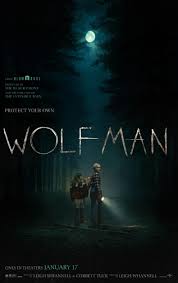
WOLF MAN
US, 2025, 103 minutes, Colour.
Christopher Abbott, Julia Garner, Sam Jaeger, Matilda Firth, Benedict Hardie, Zac Chandler.
Directed by Leigh Whannell.
A few years ago, Australian writer-director, Leigh Whannell, who has had a successful career with horror films, the Saw franchise, of the Insidious franchise, directed the remake of The Invisible Man, which was very successful with both critics and box office. He has now followed up with Wolf Man. But, it is not so much in the tradition of the previous Wolf Man horror films but rather a new development, a 21st-century perspective with reference to Native American traditions.
There is quite a contrast between the impact of The Invisible Man and Wolf Man, the visibility and invisibility. A filmmaker can work more subtle variations on horror and terror when the terrorising character is invisible, able to appear or disappear, those terrified not knowing where the invisible man is, present or absent, suddenly menacing. With the Wolf Man, everything is visible. This is very much the case here.
The setting is Oregon, forested mountains and valleys, a recluse taking his young son out hunting, trying to prepare him for the sense of menace and the tradition of a strange creature, somehow or other infected, wolflike manifestations, and, according to the Native American traditions named here, “the face of the Wolf”.
The action, in fact, takes place 30 years later. The young boy, Blake (Christopher Abbott) is npw a writer in New York, married with a young daughter, Ginger (McK enna Roberts) full-time parent, his nervy wife Charlotte (Julia Garner) a journalist. When news comes about the will of his dead father, he suggests they all go to Oregon which will bond them as a family.
As we guess, big mistake!
Most of the film takes place overnight, the family arriving with a huge van for removals lost in the forest, encountering a friend from the past, but suddenly confronted by the mysterious presence. The truck crashes, Blake is scratched and bleeding, Charlotte and Ginger terrified.
So, we see the gradual transformation of Blake into a monstrous version of himself, his daughter terrified, Charlotte able to assert some kind of authority to help.
This is a film of horror with the transformation, gradual and ugly, into the Wolf Man. It is also a film of terror for Charlotte and Ginger. And for audiences who appreciate and respond to this kind of horror and who have an enjoyment of menace and terror, this is what Wolf Man sets out to offer.
- The popularity of Wolf Man stories? Classic films? 21st-century interpretation?
- The beauty of the Oracle mountains and forests, the father and son, their home, the equipment and communication, hunting, the rifles? The stern father, the boy and his attention, fears, going to ship the deer, his father’s reaction, and up on the lookout, his father’s explanations? At home, the effect of the father on the boy? The personality of the Father, war, communications? Then the story of his disappearance?
- 30 years later, New York City, Blake, writer, looking out his daughter, Charlotte, at work, her moods, difficulties at home, phone calls? Blake and his daughter, protecting her, her reading his mind, the meals?
- The news of his father’s will, the suggestion to go to Oregon, the fan, travelling through the forest, the desd end gate, Derek on the lookout, the fears, his friendliness, back story, guiding them to the house? The apparition of the road, swerving, the crash, Derek falling out, being taken away by the creature? The creature, the struggle, Blake being scratched, mother and daughter on the roof of the van, walking through the woods, finding the house, getting the lights going, the threats, locking the door?
- Blake and his transformation, the arm, the blood, Charlotte ending the wound, his later tearing it off, chewing on his arm, the impact on Charlotte, the impact on Ginger? Her age, dependence on her father, not so close to her mother, her mother having to protect her, her being bewildered by the transformation of her father?
- Blake and the further degeneration, his face, the touch of the Wolf, facial hair, the blood, his trying to protect them, Charlotte and her getting the engine going, trying to escape in the car, Blake leading of the creature?
- The revelation that the creature was Blake’s father, the confrontation between the two, the fight, the destruction of the creature? Blake and his death?
- A grim ending, the action taking place overnight, the pessimism of this variation of the Wolf Man story?